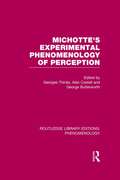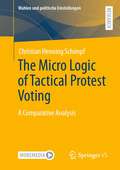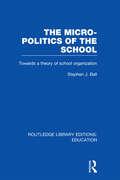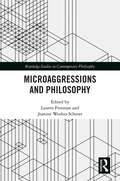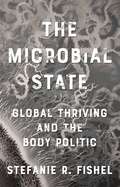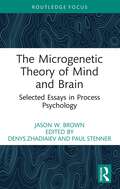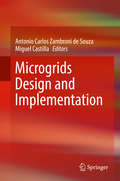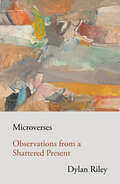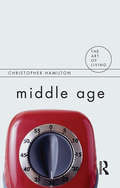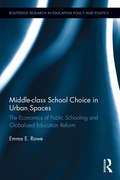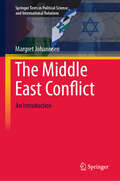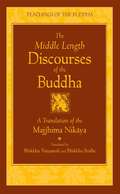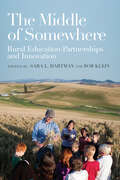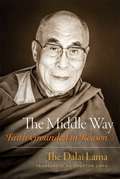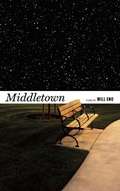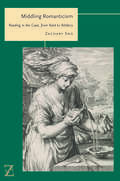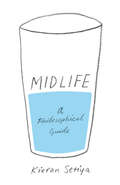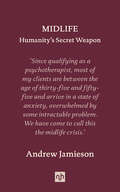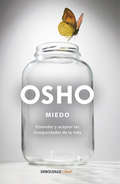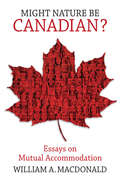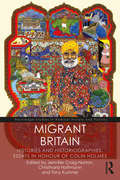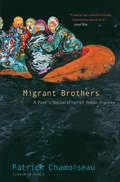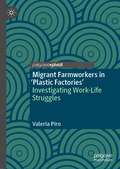- Table View
- List View
Michotte's Experimental Phenomenology of Perception (Routledge Library Editions: Phenomenology)
by Georges Thinès, Alan Costall and George ButterworthThis volume of collected papers, with the accompanying essays by the editors, is the definitive source book for the work of this important experimental psychologist. Originally published in 1991, it offered previously inaccessible essays by Albert Michotte on phenomenal causality, phenomenal permanence, phenomenal reality, and perception and cognition. Within these four sections are the most significant and representative of the Belgian psychologist's research in the area of experimental phenomenology. Extremely insightful introductions by the editors are included that place the essays in context. Michotte's ideas have played an important role in much research on the development of perception, and his work on social perception continues to be influential in social psychology. The book also includes some lesser-known aspects of his work that are equally important; for example, a remarkable set of articles on pictorial analysis.
The Micro Logic of Tactical Protest Voting: A Comparative Analysis (Wahlen und politische Einstellungen)
by Christian Henning SchimpfThis book identifies the different forms that protest voting can take in times when populism flourishes. Contrary to the popular view of protest voting as merely venting frustration, this book argues that protest voting can also be conceived of as a strategic signal of discontent, originating from sources, such as party policy positions. The empirical analyses rest on election survey data collected in democratic countries around the world between 2005 and 2017 to understand protest voting as a strategic signal, and the conditions under which it occurs. The main results show that protest voting can indeed be a strategic signal. This finding challenges the predominant view in the literature and the public discourse of protest voters as aimless, frustrated voters.
The Micro-Politics of the School: Towards a Theory of School Organization (Routledge Library Editions: Education)
by Stephen J. BallStephen Ball’s micro-political theory of school organization is a radical departure from traditional theories. He rejects a prescriptive ‘top down’ approach and directly addresses the interest and concerns of teachers and current problems facing schools. In doing so he raises question about the adequacy and appropriateness of the existing forms of organizational control in schools. Through case studies and interviews with teachers, the book captures the flavour of real conflicts in schools – particularly in times of falling rolls, change of leadership or amalgamations – when teachers’ autonomy seems to be at stake.
Microaggressions and Philosophy (Routledge Studies in Contemporary Philosophy)
by Lauren Freeman Jeanine Weekes SchroerThis is the first book to offer a philosophical engagement with microaggressions. It aims to provide an intersectional analysis of microaggressions that cuts across multiple dimensions of oppression and marginalization, and to engage a variety of perspectives that have been sidelined within the discipline of philosophy. The volume gathers a diverse group of contributors: philosophers of color, philosophers with disabilities, philosophers of various nationalities and ethnicities, and philosophers of several gender identities. Their unique frames of analysis articulate both how the concept of microaggressions can be used to clarify and sharpen our understanding of subtler aspects of oppression and how analysis, expansion, and reconceiving the notion of a microaggression can deepen and extend its explanatory power. The essays in the volume seek to defend microaggressions from common critiques and to explain their impact beyond the context of college students. Some of the guiding questions that this volume explores include, but are not limited to, the following: Can microaggressions be established as a viable scientific concept? What roles do microaggressions play in other oppressive phenomena like transphobia, fat phobia, and abelism? How can epistemological challenges around microaggressions be addressed via feminist theory, critical race theory, disability theory, or epistemologies of ignorance? What insights can be gleaned from intersectional analyses of microaggressions? Are there domain-specific analyses of microaggressions that would give insight to features of that domain, i.e. microaggressions related to sexuality, athletics, immigration status, national origin, body type, or ability. Microaggressions and Philosophy features cutting-edge research on an important topic that will appeal to a wide range of students and scholars across disciplines. It includes perspectives from philosophy of psychology, empirically informed philosophy, feminist philosophy, critical race theory, disability theory, philosophy of language, philosophy of science, and social and political philosophy.
The Microbial State: Global Thriving and the Body Politic
by Stefanie R. FishelFor three centuries, concepts of the state have been animated by one of the most powerful metaphors in politics: the body politic, a claustrophobic and bounded image of sovereignty. Climate change, neoliberalism, mass migration, and other aspects of the late Anthropocene have increasingly revealed the limitations of this metaphor. Just as the human body is not whole and separate from other bodies—comprising microbes, bacteria, water, and radioactive isotopes—Stefanie R. Fishel argues that the body politic of the state exists in dense entanglement with other communities and forms of life. Drawing on insights from continental philosophy, science and technology studies, and international relations theory, this path-breaking book critiques the concept of the body politic on the grounds of its very materiality. Fishel both redefines and extends the metaphor of the body politic and its role in understanding an increasingly posthuman, globalized world politics. By conceiving of bodies and states as lively vessels, living harmoniously with multiplicity and the biosphere, she argues that a radical shift in metaphors can challenge a politics based on fear to open new forms of global political practice and community. Reframing the concept of the body politic to accommodate greater levels of complexity, Fishel suggests, will result in new configurations for the political and social organization necessary to build a world in which the planet&’s inhabitants do not merely live but actively thrive.
The Microgenetic Theory of Mind and Brain: Selected Essays in Process Psychology
by Jason W. BrownThis book asks where ideas, objects and feelings come from and how they arise via an exploration of the nature of subjective experience and its relation to the world. Seeking an explanation for the experience of subjective duration and the present and in contrast to the conception of mental events as non-temporal logical solids, it explores a diachronic processual theory founded on psychological data and clinical observation that provides an explanatory “system” of thought adequate to the phenomena it is called on to explain. The author focuses on the intra-psychic sources and nature of subjective experience, with the intent of examining a variety of phenomena from the standpoint of microgenetic theory. The chapters deal with the origins of human subjectivity and the epochal nature of time and duration, change and the relevance of a theory of the mental state to dream and the waking present. Based on speculative psychology that flows from case studies in neuropsychology and concepts in process philosophy, it advances a theory of mind and brain that brings together previous, fragmentary research studies on this topic.
Microgrids Design and Implementation
by Antonio Carlos Zambroni de Souza Miguel CastillaThis book addresses the emerging trend of smart grids in power systems. It discusses the advent of smart grids and selected technical implications; further, by combining the perspectives of researchers from Europe and South America, the book captures the status quo of and approaches to smart grids in a wide range of countries. It describes the basic concepts, enabling readers to understand the theoretical aspects behind smart grid formation, while also examining current challenges and philosophical discussions. Like the industrial revolution and the birth of the Internet, smart grids are certain to change the way people use electricity. In this regard, a new term – the “prosumer” – is used to describe consumers who may sometimes also be energy producers. This is particularly appealing if we bear in mind that most of the distributed power generation in smart grids does not involve carbon emissions. At first glance, the option of generating their own power could move consumers to leave their current energy provider. Yet the authors argue that doing so is not a wise choice: utilities will play a central role in this new scenario and should not be ignored.
Microverses: Observations from a Shattered Present
by Dylan RileyShort essays of social theory for damaged times, encompassing intellectual history, philosophy and cultureMicroverses comprises over a hundred short essays inviting us to think about society – and social theory – in new ways. Lockdown created the conditions for what Adorno once termed &‘enforced contemplation&’. Dylan Riley responded with the tools of his trade, producing an extraordinary trail of notes exploring how critical sociology can speak to this troubled decade. Microverses analyses the intellectual situation, the political crisis of Trump&’s last months in office, and love and illness in a period when both were fraught with the public emergency of the coronavirus.Riley brings the theoretical canon to bear on problems of intellectual culture and everyday life, working through Weber and Durkheim, Parsons and Dubois, Gramsci and Lukács, MacKinnon and Fraser, to weigh sociology&’s relationship to Marxism and the operations of class, race and gender, alongside discursions into the workings of an orchestra and the complicatedness of taking a walk in a pandemic.Invitations rather than finished arguments, the notes attempt to recover the totalising perspective of sociology – the ability to see society in the round, as though from the outside – and to recuperate what Paul Sweezy described as a sense of the &‘present as history&’.
Middle Age (The Art of Living)
by Christopher HamiltonMiddle age, for many, marks a key period for a radical reappraisal of one's life and way of living. The sense of time running out, both from the perspective that one's life has ground to a halt, and from the point of view of the greater closeness of death, and the sense of loneliness engendered by the compromised and wasteful nature of life, become ever clearer in mid-life, and can lead to a period of dramatic self doubt.In this book, the philosopher Christopher Hamilton (early 40s) explores the moods, emotions and experiences of middle age in the contemporary world, seeking to describe and analyze that period of life philosophically. Hamilton draws on his own personal experiences of turning 40 as well as a wide range of sources - from the philosophical writings of Schopenhauer, Nietzsche, Hegel, Heidegger to the literature of Tolstoy, Dostoevsky, Conrad and the films of Woody Allen - to offer us a philosophy of middle age.Some of the many fascinating themes explored include the strong sense of nostalgia experienced in mid-life, of loss for one's youth, and of regret, the sense that life has become boring, the recognition that one can never fully escape feelings of guilt, and - central to the experience of middle age - the question of what is the point of going on at all. In the light of the 'melancholy wisdom' of mid-life Hamilton suggests that pleasure becomes much more important than at previous stages of life and he shows that the enjoyment of pleasure can be something noble.Insightful, entertaining, and thought-provoking, "Middle Age" is fascinating reading and for anyone heading for a 'mid-life crisis' it is much cheaper than buying a sports car.
Middle-class School Choice in Urban Spaces: The economics of public schooling and globalized education reform (Routledge Research in Education Policy and Politics)
by Emma E. RoweMiddle-class School Choice in Urban Spaces examines government-funded public schools from a range of perspectives and scholarship in order to examine the historical, political and economic conditions of public schooling within a globalized, post-welfare context. In this book, Rowe argues that post-welfare policy conditions are detrimental to government-funded public schools, as they engender consistent pressure in rearticulating the public school in alignment with the market, produce tensions in serving the more historical conceptualizations of public schooling, and are preoccupied by contemporary profit-driven concerns. Chapters focus on public schooling from different global perspectives, with examples from Chile and the US, to examine how various social movements encapsulate ideologies around public schooling. Rowe also draws upon a rich, five-year ethnographic study of campaigns lobbying the Victorian State Government in Australia for a brand-new, local-specific public school. Critical attention is paid to the public school as a means to achieve empowerment and overcome discrimination, and both a local and global lens are used to identify how parents choose the public school, the values they attach to it, and the strategies they use to obtain it. Also considered, however, are how quality gaps, distances and differences between public schools threaten to undermine the democracy of education as a means for individuals to be socially mobile and escape poverty. This book makes an important contribution to our understanding of global social movements and activism around public education. As such, it will be of key interest to researchers, academics and postgraduate students in the field of education, specifically those working on school choice, class and identity, as well as educational geography.
The Middle East Conflict: An Introduction (Springer Texts in Political Science and International Relations)
by Margret JohannsenThis textbook deals with the Middle East conflict as a key element of international relations. The origins of the conflict and its international dimensions, the major Israeli-Arab wars, attempts at a solution, peace plans and visions for the future are presented in a concise manner. Extensive map material illustrates the findings.The English translation of this book, originally in German, was facilitated by artificial intelligence. The content was later revised by the author for accuracy.
The Middle Length Discourses of the Buddha: A Translation of the Majjhima Nikaya (The Teachings of the Buddha)
by Bhikkhu Bodhi Bhikkhu NanamoliThis book offers a complete translation of the Majjhima Nikaya, or Middle Length Discourses of the Buddha, one of the major collections of texts in the Pali Canon, the authorized scriptures of Theravada Buddhism. This collection--among the oldest records of the historical Buddha's original teachings--consists of 152 suttas or discourses of middle length, distinguished as such from the longer and shorter suttas of the other collections. The Majjhima Nikaya might be concisely described as the Buddhist scripture that combines the richest variety of contextual settings with the deepest and most comprehensive assortment of teachings. These teachings, which range from basic ethics to instructions in meditation and liberating insight, unfold in a fascinating procession of scenarios that show the Buddha in living dialogue with people from many different strata of ancient Indian society: with kings and princes, priests and ascetics, simple villagers and erudite philosophers. Replete with drama, reasoned argument, and illuminating parable and simile, these discourses exhibit the Buddha in the full glory of his resplendent wisdom, majestic sublimity, and compassionate humanity. The translation is based on an original draft translation left by the English scholar-monk Bhikkhu Nanamoli, which has been edited and revised by the American monk Bhikkhu Bodhi, who provides a long introduction and helpful explanatory notes. Combining lucidity of expression with accuracy, this translation enables the Buddha to speak across twenty-five centuries in language that addresses the most pressing concerns of the contemporary reader seeking clarification of the timeless issues of truth, value, and the proper conduct of life. Winner of the 1995 Choice Magazine Outstanding Academic Book Award, and the Tricycle Prize for Excellence in Buddhist Publishing for Dharma Discourse.
The Middle of Somewhere: Rural Education Partnerships and Innovation
by Sara L. Hartman and Bob KleinHighlights innovative partnership practices that help create educational opportunities for students in rural schools across the United States.As editors Sara L. Hartman and Bob Klein acknowledge, rural places have long experienced systemic inequities that decrease rural students' access to education, yet many rural schools and communities have found creative means to make up for the dearth of outside resources. The Middle of Somewhere brings to light a wide variety of partnerships that have been forged between K–12 schools, communities, and postsecondary institutions to improve educational access. The book showcases collaborations that address three different areas of need: partnerships that prepare and support teacher candidates and educators who work in rural areas; partnerships that extend the work of rural education networks; and partnerships that promote equity, justice, and inclusion within rural populations. Using case studies of rural educational partnerships from communities across the United States, the book's contributors share their experiences of how strong partnerships have formed both organically and through thoughtful and intentional planning, and they recommend supportive strategies for their development and sustainment. The contributors also explore the many ways in which university–school–community partnerships incubate solutions to challenges common to rural education systems, such as access to STEM education and higher education. The programs featured here may serve as replicable models for practitioners, researchers, and policy makers who want to enrich the experiences of children in their schools and communities.
The Middle Way
by His Holiness the Dalai Lama Thupten JinpaThe Dalai Lama opens The Middle Way with an elegant argument for the power of compassion in cultivating a happy life. From there, he connects core ideas of Buddhist philosophy to the truths of our shared condition. His Holiness delivers a sparklingly clear teaching on how the Buddhist ideas of emptiness and interdependency relate to personal experience and bring a deeper understanding of the world around us. In down-to-earth style, this book sets forth a comprehensive explanation of the foundational teachings of the Mahayana tradition based on the works of two of Buddhism's most revered figures. Using Nagarjuna's Middle Way, the Dalai Lama explores Buddhist understandings of selflessness, dependent origination, and the causal processes that lock us in cycles of suffering. He grounds these heady philosophical discussions using Tsongkhapa's Three Principal Aspects of the Path, presenting a brief explanation of how to put ethical discipline, wisdom, and compassion into practice. Through these beautifully complementary teachings, His Holiness urges us to strive, "with an objective mind, endowed with a curious skepticism, to engage in careful analysis and seek the reasons behind our beliefs."
Middletown
by Will Eno"Will Eno is an original, a maverick wordsmith whose weird, wry dramas gurgle with the grim humor and pain of life."-GuardianA moving and funny new play exploring the universe of a small American town. As a friendship develops between longtime resident John Dodge and new arrival Mary Swanson, the lives of the inhabitants of Middletown intersect in strange and poignant ways in a journey that takes them from the local library to outer space and points between.
Middling Romanticism: Reading in the Gaps, from Kant to Ashbery (Lit Z)
by Zachary SngRomanticism is often understood as an age of extremes, yet it also marks the birth of the modern medium in all senses of the word. Engaging with key texts of the romantic period, the book outlines a wide-reaching project to re-imagine the middle as a constitutive principle. Sng argues that Romanticism dislodges such terms as medium, moderation, and mediation from serving as mere self-evident tools that conduct from one pole to another. Instead, they offer a dwelling in and with the middle: an attention to intervals, interstices, and gaps that make these terms central to modern understandings of relation.
Midlife: A Philosophical Guide
by Kieran SetiyaPhilosophical wisdom and practical advice for overcoming the problems of middle ageHow can you reconcile yourself with the lives you will never lead, with possibilities foreclosed, and with nostalgia for lost youth? How can you accept the failings of the past, the sense of futility in the tasks that consume the present, and the prospect of death that blights the future? In this self-help book with a difference, Kieran Setiya confronts the inevitable challenges of adulthood and middle age, showing how philosophy can help you thrive.You will learn why missing out might be a good thing, how options are overrated, and when you should be glad you made a mistake. You will be introduced to philosophical consolations for mortality. And you will learn what it would mean to live in the present, how it could solve your midlife crisis, and why meditation helps.Ranging from Aristotle, Schopenhauer, and John Stuart Mill to Virginia Woolf and Simone de Beauvoir, as well as drawing on Setiya’s own experience, Midlife combines imaginative ideas, surprising insights, and practical advice. Writing with wisdom and wit, Setiya makes a wry but passionate case for philosophy as a guide to life.
Midlife: Humanity's Secret Weapon
by Andrew JamiesonA radical new take on one of humanity's most misunderstood periods of transition: the midlife crisis.Only two species of mammal have a post-reproductive life that lasts longer than their reproductive life: killer whales, whose elders are able to sniff out food supplies over vast oceanic distances to keep their pods fed, and Homo sapiens. While the evolutionary purpose of the killer whale&’s extensive life seems clear, what is the point of ours?This was a question that intrigued the psychoanalyst Carl Jung, who observed that if a culture is to maintain its deepest, profoundest roots while moving forward to embrace the challenges of historical and technological change, it needs to find an equilibrium between the energy, vigor, and creativity of those in the ego-driven first half of life and the experience, dignity, and wisdom of those in the second. But to make it to that second half of life, we need to traverse the dreaded middle years, when so many of us find ourselves discontented with our jobs, unhappy in our relationships, and lamenting our fetishized youths.In this highly readable and groundbreaking new book, the psychoanalyst Andrew Jamieson examines the Jungian concept of the midlife crisis to show how it is an essential evolutionary and social rite of passage that we all must proceed through—a set of challenges that we either take advantage of or ignore, depending on whether our complex or neurosis blocks this developmental impulse.Drawing on history, psychology, science, and literature, Jamieson shows just how ubiquitous, and crucial, the &“midlife crisis&” is, and the devastating consequences for society at large if we continue to regard it as something we can, and should, avoid.
Miedo
by Osho OshoLa vida es inseguridad. Cada momento nos lleva a una inseguridad cada vez más profunda. Es un juego en el que nadie sabe cuál será el siguiente paso. ¡En esto radica la belleza de la existencia! Si fuera predecible, no valdría la pena vivir la vida; si todo fuera tal y como deseáramos que fuese y no hubiese lugar para la incertidumbre, no seríamos seres humanos sino máquinas, ya que solo para ellas todo es seguro y cierto.El hombre vive en libertad. La libertad necesita inseguridad e incertidumbre.En el interior del libro, el lector encontrará el código de descarga de una meditación guiada.
Might Nature Be Canadian?: Essays on Mutual Accommodation
by William A. MacdonaldMutual accommodation is about co-operation, compromise, and inclusion. It's a big idea, equal to freedom, science, and compassion. The postwar global economic order led by the United States is one of the greatest historic achievements of mutual accommodation, yet it is now at risk from the centrifugal forces that have led to populism. Today, to many nations and people, Canada is the model country driven by successful mutual accommodation. In Might Nature Be Canadian? William Macdonald explores the theme of mutual accommodation with a close lens on the Canadian experience. Canada has a drive toward mutual accommodation. The United States has a strong drive toward division. There has always been a divergence of ideologies between the two countries. The United States now appears to view the world as a never-ending struggle, which has become greater since 2000, between good and evil, while Canada, by contrast, leans toward the idea that there is an underlying order at the heart of things. Canada has always faced strong limits in creatively overcoming a challenging geography and French/English language differences within its own borders; on the other hand the United States sees itself as a country with virtually no limits. Throughout its history Canada's drive toward mutual accommodation, stronger than that of any other country, has allowed its increasingly diverse citizens to live together peacefully and successfully, even as they retain their own culture, language, and religion. Nature can be described as simultaneously either/or and both/and. Is there something fundamentally Canadian about this? Taking inspiration from British philosopher Alfred North Whitehead, who said that "civilization is the triumph of persuasion over force," Macdonald argues that the urgent spread of mutual accommodation, a charge led by Canada, is central to achieving a bearable world for everyone.
Might Nature Be Canadian?: Essays on Mutual Accommodation
by William A. MacdonaldMutual accommodation is about co-operation, compromise, and inclusion. It's a big idea, equal to freedom, science, and compassion. The postwar global economic order led by the United States is one of the greatest historic achievements of mutual accommodation, yet it is now at risk from the centrifugal forces that have led to populism. Today, to many nations and people, Canada is the model country driven by successful mutual accommodation. In Might Nature Be Canadian? William Macdonald explores the theme of mutual accommodation with a close lens on the Canadian experience. Canada has a drive toward mutual accommodation. The United States has a strong drive toward division. There has always been a divergence of ideologies between the two countries. The United States now appears to view the world as a never-ending struggle, which has become greater since 2000, between good and evil, while Canada, by contrast, leans toward the idea that there is an underlying order at the heart of things. Canada has always faced strong limits in creatively overcoming a challenging geography and French/English language differences within its own borders; on the other hand the United States sees itself as a country with virtually no limits. Throughout its history Canada's drive toward mutual accommodation, stronger than that of any other country, has allowed its increasingly diverse citizens to live together peacefully and successfully, even as they retain their own culture, language, and religion. Nature can be described as simultaneously either/or and both/and. Is there something fundamentally Canadian about this? Taking inspiration from British philosopher Alfred North Whitehead, who said that "civilization is the triumph of persuasion over force," Macdonald argues that the urgent spread of mutual accommodation, a charge led by Canada, is central to achieving a bearable world for everyone.
Migrant Britain: Histories and Historiographies: Essays in Honour of Colin Holmes (Routledge Studies in Radical History and Politics)
by Jennifer Craig-Norton Christhard Hoffmann Tony KushnerBritain has largely been in denial of its migrant past - it is often suggested that the arrivals after 1945 represent a new phenomenon and not the continuation of a much longer and deeper trend. There is also an assumption that Britain is a tolerant country towards minorities that distinguishes itself from the rest of Europe and beyond. The historian who was the first and most important to challenge this dominant view is Colin Holmes, who, from the early 1970s onwards, provided a framework for a different interpretation based on extensive research. This challenge came not only through his own work but also that of a 'new school' of students who studied under him and the creation of the journal Immigrants and Minorities in 1982. This volume not only celebrates this remarkable achievement, but also explores the state of migrant historiography (including responses to migrants) in the twenty-first century.
Migrant Brothers: A Poet's Declaration of Human Dignity
by Patrick Chamoiseau Matthew Amos Fredrik Rönnbäck“If justice had a Jericho trumpet, Chamoiseau would be it.”—Junot Díaz <P><P>As migrants embark on perilous journeys across oceans and deserts in pursuit of sanctuary and improved living conditions, what is the responsibility of those safely ensconced in the nations they seek to enter? <P>Moved by repeated tragedies among immigrants attempting to enter eastern and southern Europe, Patrick Chamoiseau assails the hypocrisy and detachment that allow these events to happen. Migrant Brothers is an urgent declaration of our essential interconnectedness that asserts the necessity to understand one another as part of one human community, regardless of national origin.
Migrant Farmworkers in 'Plastic Factories’: Investigating Work-Life Struggles
by Valeria PiroThis book provides a fine-grained ethnographic examination of the everyday negotiations and conflicts taking place in greenhouses and packinghouses in an agricultural district in south-eastern Italy (Sicily). In a highly competitive global scenario, driven by multinational corporations and large retailers, small and medium-sized farms largely rely on migrant labour to fill their demand for casualized, flexible and low-paid jobs. By taking the reader into the ‘plastic factories’ where the author was hired as a farmworker, this book sheds light on the struggles – around the employment contract, the wage and the body – which take place every day between employers and employees. The book contributes to broadening the understanding of the dynamics innervating food production worldwide by recognizing the pivotal role of migrant labour not only as a factor in the restructuring of global supply chains, but also as an actor shaping these processes through its own unpredictable strategies.

